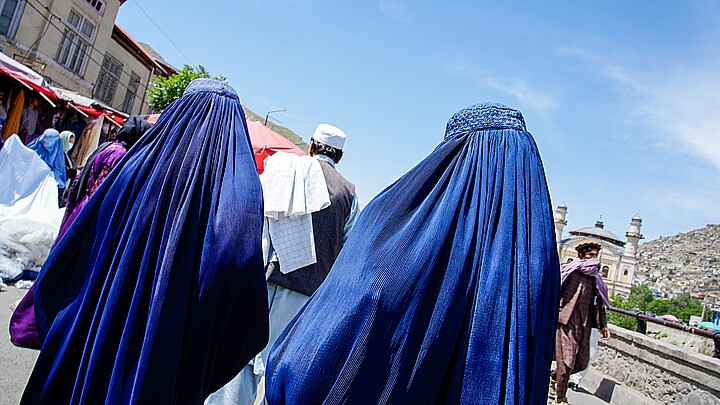Politics
U.N. Security Council: Al-Qaeda and ISIS-K taking cover as Taliban officials in Afghanistan
Three years after the chaotic withdrawal of U.S. forces from Afghanistan, the Middle Eastern country has become a hideout for al-Qaeda and ISIS operatives

August 29, 2024 10:31am
Updated: August 29, 2024 10:38am
Three years after the chaotic withdrawal of U.S. forces from Afghanistan, the Middle Eastern country has become a hideout for al-Qaeda and ISIS operatives.
A new report published in July by the U.N. Security Council report published in July said al Qaeda has regrouped in Afghanistan, warning that it strategizing to orchestrate terror attacks in other countries.
Terrorists hiding out inside Afghanistan and facilitating attacks outside the country
The report says that various governments throughout the world have become concerned about terrorist threats from al-Qaeda and ISIS operatives, noting that ISIS-K relies on networks of “facilitators” in both Afghanistan and Turkey who can move their operatives from Central Asia “towards Europe to conduct external operations.”
According to the United Nations report, the regional ISIS affiliate, known commonly as ISIS-K or ISKP, has escalated its recruitment efforts and is most likely responsible for sending funds, operatives and training for large-scale attacks carried out earlier this year in Iran and Russia and Iran.
The recent, foiled terror plot planned against Taylor Swift concerts in Vienna was planned by operatives linked to ISIS. Swift was scheduled to perform Aug. 8-10 at Ernst Happel Stadium in Vienna to an estimated 170,000 fans, but the concerts were cancelled as a result of the terror threat.
The report also said that while ISIS was deploying its activities outside Afghanistan’s borders, al-Qaeda has been burrowing in Taliban run Afghani government institutions.
“Al Qaeda remains strategically patient, cooperating with other terrorist groups in Afghanistan and prioritizing its ongoing relationship with the Taliban,” the U.N. report said, saying that the terror group was operating “covertly in order to project the image of Taliban adherence to the provisions of the Doha agreement.”
How terrorists were expelled from Afghanistan during the War on Terror
Al-Qaeda, known in English as “The Base” was the terror group responsible for crashing two commercial airline jets into the World Trade Center twin towers in New York City on Sept. 11, 2001.
The organization was largely degraded as part of President George W. Bush’s War on Terror in the region and after U.S. forces were deployed to Afghanistan and Iraq, but it has been gradually rebuilding and amassing its forces since the Bush presidency came to an end.
The Doha agreement, which began negotiations was signed into effect in 2020 during the Trump administration, committing to a gradual U.S. withdrawal under certain peace conditions that would have left the country in the hands of the Afghan National Defense and Security Forces (ANDSF).
Some analysts have criticized the Biden administration for its hasty removal of U.S. troops, which in turn enabled a Taliban insurgency and overthrow of Afghani officials.
Three years later after the U.S. and NATO withdrawal, terror organizations are regrouping in Afghanistan, which was previously used as a hideout and training ground for al-Qaeda leader Osama bin Laden, who previously helped lead Afghani Mujahideen rebel forces against the Soviet Union invasion of Afghanistan during the 1980s.
The USSR withdrew its forces in defeat in 1989 after the Mujahideen struck back at Soviet air forces with U.S. built Stinger anti-aircraft missiles
Terrorists return and take cover in Taliban institutions, Afghani government offices
Warnings that Afghanistan would become a launching pad for global terrorist attacks surfaced even before the Biden administration effectuated the hasty withdrawal.
In the first year of Taliban rule from 2021-2022, al-Qaeda began to resurface in Afghanistan.
According to an Aug. 15, 2023 report published by the U.S. Institute for Peace (USIP), once the U.S. withdrew forces, the terror group began “messaging more actively.”
Its then-leader Ayman al-Zawahiri “issued more statements than he had in a long time, with some inciting violence.” In fact, al-Zawahiri's presence in Kabul, Afghanistan, “marked the peak of al-Qaeda's post-takeover activity,” says the report.
But one year after the American forces withdrew, a U.S. drone strike killed al-Zawahiri in Kabul’s Green Zone diplomatic district.
While the USIP said in 2023 that al-Zawahiri has since been “relatively subdued,” in the country, the new July 2024 U.N. report says that the terror group has now reemerged and begun setting up new facilities—a clear violation of the Doha agreement, which committed the Taliban to ensuring that the country would never again be used as a terrorist training or operating space.
According to the U.N. Security Council report, al-Qaeda members are arriving in the country and taking cover as Taliban operatives as to conceal their presence there.
One of the al-Qaeda operatives, the report says, includes a Libyan who was actually working for Taliban's Ministry of Interior. The individual, according to the U.N. report, has “no clear job description and has been issued an Afghan passport.”
ISIS-K is also taking cover by planting its operatives throughout Afghanistan's Taliban-run security ministries, according to the report.
While the U.N. report suggests there is a collaborative effort between the Taliban and the terror groups, some experts, and U.S. Institute of Peace suggest the relationship is more adversarial.
“The Taliban have the will to fight against ISKP,” Arian Sahrifi, a lecturer at the Princeton School of Public and International Affairs, said during a recent webinar held on the issue. “They are really committed to do that, but they are lacking in operational capability to conduct really effective counterterrorism against the ISKP.”
Hafiz Zia Ahmad, a deputy spokesman for Afghanistan's Taliban-run Ministry of Foreign Affairs said that Afghanistan is “a safe and stable country” in a social media post last week.
He insists that Taliban forces are complying with the Doha agreement and have “successfully neutralized” ISIS-Khorasan in his country.
U.S. intelligence officials, however, say that while the country has not yet become a launching pad for terrorist activities, the U.S. is committed to combatting terror operations there.
U.S. continuing to “invest” and “deploy resources” to combatting terror operations in Afghanistan
While terror groups are amassing in Afghanistan, CIA Deputy Director David Cohen said the country has not become a significant launching pad for international terrorism, but the operations are a rising concern.
In a recent Rockville, Maryland national security conference the CIA deputy director said the U.S. has not focused on Afghanistan during the Biden administration because it has turned its attention to national security related issues in Russia and China, adding that terrorism remains a key focus for U.S. intelligence agencies.
“We continue to invest in it, we’re continuing to deploy resources,” he explained.
Cohen conceded that ISIS-K remains the top terrorist threat in Afghanistan and said that the landscape in the Middle Eastern country has, in some ways, become more complicated since Sept. 11, 2001.
He said that “it’s worthwhile to take stock of some progress” in the West’s counterterrorism efforts, referencing the killing of Al Qaeda chief Ayman Zawahiri, and explained that the Central Intelligence Agency (CIA) has maintained an open line of communication with the Taliban.
“We have been engaging with them, all throughout this period, in various ways, as they have taken on the effort to combat both Al Qaeda and ISIS-K … and so this isn’t a 'mission accomplished' sort of thing. But it is worth noting that in Afghanistan today, the dire predictions have not come to pass,” Cohen said.
Diplomatic relations with Afghanistan
Since the Taliban took power again in 2021, no world power has actually granted diplomatic recognition of the regime.
Still, two American adversarial powers, Russia and China, have given the regime some moral backing in the international world stage, according a report published by CBS News.
The Taliban’s deputy prime minister has boasted about that relationship, telling the Afghani people that they have two allies in the U.N. Security Council with veto power. The Taliban official did not site Russia and China by name, but it was apparent those were the superpowers he was referring to since the United States, United Kingdom and France have continued to view the Taliban as a growing threat.
“Counting them as allies gives the regime a diplomatic advantage it didn't have during its previous period in power, potentially shielding it from any Security Council resolutions seeking action against the Taliban over its policies,” CBS explained.
China, which shares a border with Afghanistan, is the only nation state to have sent an ambassador to Afghanistan, and Beijing’s communist leader, Xi Jinping, has accepted the accreditation of a Taliban ambassador to Beijing.
China has signed several mining agreements with Afghanistan since the U.S. withdrew from the country, and Russia said in May it was planning to remove the Taliban from its list of state sponsors of terrorism,
As a result, the Taliban sent a delegation to visit Moscow as relations between Kabul and the Kremlin continue to develop.










